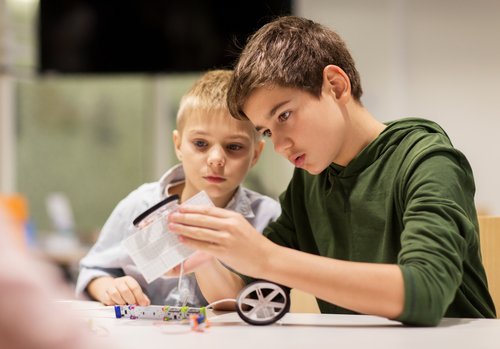What Influences the Relationship Among Siblings During Adolescence?


Written and verified by the psychologist María Alejandra Castro Arbeláez
The teenage years are a stage that’s full of changes, and the relationship among siblings during adolescence is inevitably affected. During this time in a child’s life, families move to the background. Simultaneously, a teen’s social group becomes his or her main reference point.
As a result, it’s common for sibling relationships to deteriorate. Brothers and sisters who were once best buddies can suddenly see one another as annoying, or turn into complete strangers. This being said, the relationships among siblings will have an influence over the course of adolescence.
Siblings are the people that we grow up with. They’re the one’s we’ve known for as long as we can remember, and sometimes brothers and sisters even help to raise one another. It’s common for parents to say over and over that siblings are supposed to be best friends, that they’ll be around for the rest of our lives, that they’re unconditional, etc.
“I don’t believe an accident of birth makes people sisters and brothers. It makes them siblings, gives them mutuality of parentage. Sisterhood and brotherhood is a condition people have to work at.”
–Maya Angelou
What influences the relationship among siblings during adolescence?
- Each child’s personality and temperament will help or hinder the building of a good relationship.
- The age difference among siblings. The greater the age difference, the less shared experiences siblings will have and, therefore, the weaker their bond may be.
- The education and treatment – subjective or not – that children receive from their parents. If teens feel like their siblings have gotten preferential treatment from their parents, then they may become resentful. This can translate into a relationship plagued with rivalry.
- The interests of both siblings. The more interests and hobbies that siblings share, the greater their possibilities of establishing a strong bond with one another.

Adolescence and brain development
“Adolescence is similar to a degenerative disease”
– Salvador Martinez, director of the Neuroscience Institute of Alicante –
During this time in a person’s development, a phenomenon known as synaptic pruning occurs. From approximately age 12 to age 20, the brain is in the midst of development.
And this developmental process is characterized by the perfection of cognitive abilities and self-regulation, and requires learning through personal experience.
Over the course of this developmental stage, the brain undergoes morphological and functional changes through the destruction, creation and reorganization of neural connections.
The search for identity
Brain restructuring isn’t the only factor that youth must face during adolescence. We must also consider the following:
- Hormonal and physical changes.
- The influence that social context can have on teenagers.
- The search for meaning and identity.
- Exposure to new social situations that adolescents must solve on their own.
The coming together of all of these factors gives rise to emotional changes that can sometimes be difficult to understand and manage. This difficulty doesn’t just happen to teens themselves, but also to those around them. Without a doubt, this leads to an inevitable distancing between teens and their families and, therefore, a change in the relationship with siblings.
That brother or sister that was once a playmate and partner in crime can suddenly turn into a source of stress, anger, teasing or indifference. This makes the other sibling (usually the younger brother or sister) suffer the absence of their favorite buddy, which translates to sadness and melancholy.
How to help establish a good relationship among siblings during adolescence?
The best recipe for encouraging a good relationship among siblings during adolescence is to start from birth. That means we should strive to practice a democratic and respectful parenting style, without differentiating between siblings. Parents must allow their children to participate, as much as possible, in the decisions that affect them.
Once you’ve set this foundation, here are some additional pieces of advice for you to follow:
- Encourage teens to spend time with their younger siblings. As long as it doesn’t negatively impact their own activities, they can accompany siblings to some extracurricular activity or take care of them when you’re away.
- Help teens see what they mean to their siblings. Above all else, avoid making siblings see one another as rivals. Rather, encourage fraternal bonding.
- Remind teens that small changes in their treatment of their little brothers and sisters can improve the relationship between them.

Don’t make comparisons between siblings. It’s extremely important for parents not to give preferential treatment to any of their children.
- Teach your children how to problem solve. Be responsive to their demands and respect their decisions, but establish limits when necessary.
- Explain to both of them what adolescence means – the transition from childhood to adulthood, and all that this involves.
The teenage years are a stage that’s full of changes, and the relationship among siblings during adolescence is inevitably affected. During this time in a child’s life, families move to the background. Simultaneously, a teen’s social group becomes his or her main reference point.
As a result, it’s common for sibling relationships to deteriorate. Brothers and sisters who were once best buddies can suddenly see one another as annoying, or turn into complete strangers. This being said, the relationships among siblings will have an influence over the course of adolescence.
Siblings are the people that we grow up with. They’re the one’s we’ve known for as long as we can remember, and sometimes brothers and sisters even help to raise one another. It’s common for parents to say over and over that siblings are supposed to be best friends, that they’ll be around for the rest of our lives, that they’re unconditional, etc.
“I don’t believe an accident of birth makes people sisters and brothers. It makes them siblings, gives them mutuality of parentage. Sisterhood and brotherhood is a condition people have to work at.”
–Maya Angelou
What influences the relationship among siblings during adolescence?
- Each child’s personality and temperament will help or hinder the building of a good relationship.
- The age difference among siblings. The greater the age difference, the less shared experiences siblings will have and, therefore, the weaker their bond may be.
- The education and treatment – subjective or not – that children receive from their parents. If teens feel like their siblings have gotten preferential treatment from their parents, then they may become resentful. This can translate into a relationship plagued with rivalry.
- The interests of both siblings. The more interests and hobbies that siblings share, the greater their possibilities of establishing a strong bond with one another.

Adolescence and brain development
“Adolescence is similar to a degenerative disease”
– Salvador Martinez, director of the Neuroscience Institute of Alicante –
During this time in a person’s development, a phenomenon known as synaptic pruning occurs. From approximately age 12 to age 20, the brain is in the midst of development.
And this developmental process is characterized by the perfection of cognitive abilities and self-regulation, and requires learning through personal experience.
Over the course of this developmental stage, the brain undergoes morphological and functional changes through the destruction, creation and reorganization of neural connections.
The search for identity
Brain restructuring isn’t the only factor that youth must face during adolescence. We must also consider the following:
- Hormonal and physical changes.
- The influence that social context can have on teenagers.
- The search for meaning and identity.
- Exposure to new social situations that adolescents must solve on their own.
The coming together of all of these factors gives rise to emotional changes that can sometimes be difficult to understand and manage. This difficulty doesn’t just happen to teens themselves, but also to those around them. Without a doubt, this leads to an inevitable distancing between teens and their families and, therefore, a change in the relationship with siblings.
That brother or sister that was once a playmate and partner in crime can suddenly turn into a source of stress, anger, teasing or indifference. This makes the other sibling (usually the younger brother or sister) suffer the absence of their favorite buddy, which translates to sadness and melancholy.
How to help establish a good relationship among siblings during adolescence?
The best recipe for encouraging a good relationship among siblings during adolescence is to start from birth. That means we should strive to practice a democratic and respectful parenting style, without differentiating between siblings. Parents must allow their children to participate, as much as possible, in the decisions that affect them.
Once you’ve set this foundation, here are some additional pieces of advice for you to follow:
- Encourage teens to spend time with their younger siblings. As long as it doesn’t negatively impact their own activities, they can accompany siblings to some extracurricular activity or take care of them when you’re away.
- Help teens see what they mean to their siblings. Above all else, avoid making siblings see one another as rivals. Rather, encourage fraternal bonding.
- Remind teens that small changes in their treatment of their little brothers and sisters can improve the relationship between them.

Don’t make comparisons between siblings. It’s extremely important for parents not to give preferential treatment to any of their children.
- Teach your children how to problem solve. Be responsive to their demands and respect their decisions, but establish limits when necessary.
- Explain to both of them what adolescence means – the transition from childhood to adulthood, and all that this involves.
All cited sources were thoroughly reviewed by our team to ensure their quality, reliability, currency, and validity. The bibliography of this article was considered reliable and of academic or scientific accuracy.
- Ripoll, K., Carrillo, S., & Castro, J. A. (2009). Relación entre hermanos y ajuste psicológico en adolescentes: los efectos de la calidad de la relación padres-hijos. Avances en Psicología Latinoamericana, 27(1), 125-142. https://revistas.urosario.edu.co/index.php/apl/article/view/39/
- Cobos, E. G. (2008). Adolescencia y familia: revisión de la relación y la comunicación como factores de riesgo o protección. Revista intercontinental de psicología y educación, 10(2), 105-122. https://www.redalyc.org/pdf/802/80212387006.pdf
- FIRPO, P., & RICHARD-PALMERO, F. E. D. E. R. I. C. O. Habilidades sociales: diferencias entre adolescentes con hermanos mayores y adolescentes sin hermanos. http://bibliotecadigital.uda.edu.ar/objetos_digitales/843/tesis-6118-habilidadess.pdf
This text is provided for informational purposes only and does not replace consultation with a professional. If in doubt, consult your specialist.








